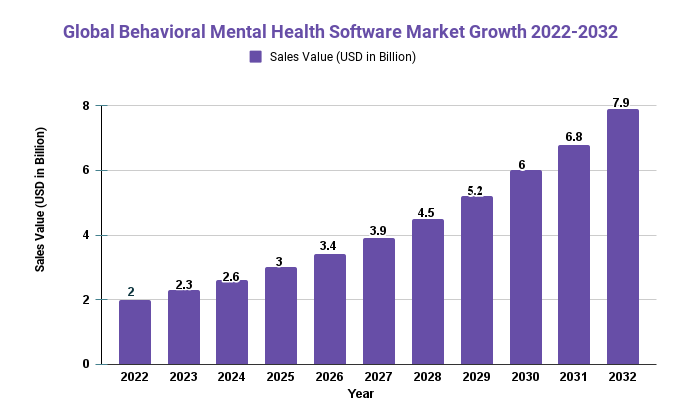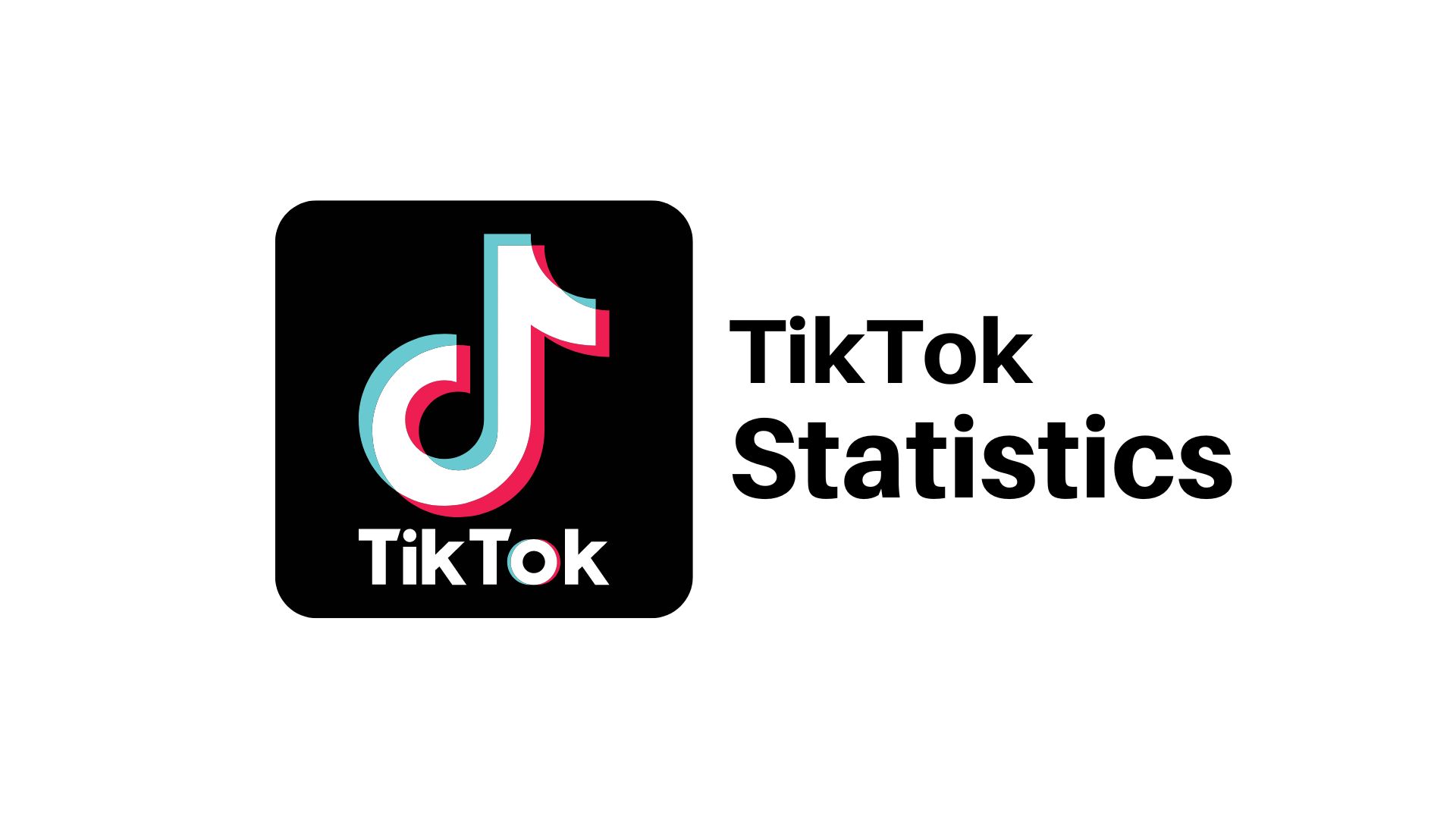Behavioral Mental Health Software Market Size USD 7.9 Bn by 2032| at a CAGR 14.8%

Page Contents
Market Overview
Published Via 11Press: The Behavioral Mental Health Software Market was projected to experience substantial growth over the coming years. This expansion is being spurred on by factors such as an increasing need for mental health services, the increasing prevalence of mental disorders, and the rising adoption of electronic health records (EHRs) and other digital healthcare technologies.
In 2022, Behavioral Mental Health Software Market was valued at USD 2.0 Bn and projected to reach USD 7.9 Bn by 2032 at a CAGR of 14.8% during the forecast period.
When it comes to software types, the market offers solutions for clinical decision support, electronic health records (EHRs), telehealth, and others. EHRs are expected to remain the largest segment of this market as they allow healthcare providers to access patient data and collaborate between care teams.
North America is currently the leading regional market for behavioral health software, due to factors such as an established healthcare infrastructure, growing government initiatives to promote mental health awareness and treatment, and major players in the region. However, Asia-Pacific is expected to experience the highest growth rate over the forecast period due to investments in healthcare infrastructure and increasing demand for mental health services.

Drivers, trends, and challenges have an impact on market dynamics, which can impact businesses. Request for PDF sample report
Key Takeaways
- The global behavioral mental health software market is expected to experience substantial growth over the coming years due to factors such as rising demand for mental health services, an increasing prevalence of mental disorders, and the rising adoption of digital health technologies.
- Electronic health records (EHRs) are expected to remain the leading segment of the market, followed by clinical decision support, telehealth, and others.
- North America is currently the leading regional market for behavioral health software, but Asia-Pacific is expected to experience the highest growth rate during this forecast period.
- Major players in this market include Cerner Corporation, Epic Systems Corporation, NextGen Healthcare, Netsmart Technologies, Inc., and Qualifacts Systems, Inc.
Regional Snapshot
- North America is currently the leading regional market for behavioral health software, due to its well-established healthcare infrastructure, increasing government initiatives to promote mental health awareness and treatment, as well as the presence of major market players within this region.
- Europe is forecasted to be the second-largest market for behavioral health software, due to increased investments in mental health services and the widespread adoption of digital health technologies.
- The Asia-Pacific region is predicted to experience the highest growth rate during this forecast period, driven by increasing investments in healthcare infrastructure and an increasing need for mental health services.
- Latin America and the Middle East & Africa are expected to witness significant growth in the coming years due to increasing awareness of mental health issues and the growing adoption of digital health technologies in these regions.
Drivers
- Growing Demand for Mental Health Services: There has been an exponential rise in the global demand for mental health services, which has spurred the adoption of behavioral mental health software. Growing awareness about mental health disorders and an escalating prevalence are driving this demand for these solutions.
- The Growing Adoption of Digital Health Technologies: The growing adoption of digital health technologies such as EHRs, telehealth, and mobile health is propelling the growth of the behavioral mental health software market. These solutions allow healthcare providers to offer remote care, improve patient outcomes and boost efficiency.
- Rising Prevalence of Mental Health Disorders: The increasing prevalence of mental health disorders such as depression, anxiety, and substance abuse is driving demand for behavioral mental health software solutions. These solutions can assist in the early detection, prevention, and management of these illnesses – ultimately improving patient outcomes.
- Government Initiatives to Enhance Mental Health Services: Governments around the world are investing in improving mental health services and increasing digital health technologies to combat the growing burden of disorders related to mental health. This has resulted in exponential growth of the behavioral mental health software market.
Restraints
- Data Privacy and Security Concerns: Storing and sharing sensitive patient data poses a major challenge for healthcare providers and patients alike, raising worries about data privacy and security that could impede the adoption of behavioral mental health software.
- Lack of Skilled Professionals: A shortage of skilled personnel to operate and manage behavioral mental health software is a major obstacle for the market. Healthcare providers require knowledgeable personnel in order to make use of these solutions effectively, so a shortage of these individuals could potentially stymie growth in this space.
- High Cost of Software: Behavioral mental health software can be costly to purchase and implement, which may restrict adoption rates, particularly in developing regions with limited financial resources.
- Limited Reimbursement Policies: Limited reimbursement policies for behavioral mental health services may discourage some consumers from seeking these solutions, particularly in regions where healthcare is mainly covered through public or private insurance plans.
Opportunities
- Growing Adoption of Telehealth: Telehealth solutions present a major opportunity for the behavioral mental health software market. They enable healthcare providers to diagnose and treat mental disorders remotely, so the growing demand for these services should drive demand for behavioral mental health software.
- Growing Demand for Personalized Medicine: The rising demand for personalized medicine is expected to fuel demand for behavioral mental health software. These solutions allow healthcare providers to customize treatment plans for patients, leading to improved patient outcomes and lower healthcare costs.
- Emerging Markets: Emerging markets such as Asia-Pacific and Latin America offer significant potential for the behavioral mental health software market. These regions boast large populations with an increasing need for mental health services, creating a lucrative growth opportunity for market players.
- Integration with Artificial Intelligence: Combining behavioral mental health software with artificial intelligence (AI) presents significant opportunities for market players. AI can be utilized to detect patterns and anticipate patient outcomes, giving healthcare providers the power to personalize treatment plans and enhance patient outcomes.
Challenges
- Lack of Standardization: The lack of standardization in the behavioral mental health software market poses a significant obstacle for market participants. Without uniformity, interoperability issues may arise which hinder the adoption of these solutions.
- Data Privacy and Security: Data privacy and security remain a major challenge for the behavioral mental health software market. Storing and sharing sensitive patient data poses a significant threat to healthcare providers and patients, so market players must invest in robust data security measures to address these concerns.
- Limitation of Mental Health Services: Limited access to mental health services, especially in developing regions, presents a major obstacle for the behavioral mental health software market. To address this issue, market players must collaborate with healthcare providers and governments to improve access to these solutions and boost their adoption rates.
- Limited Reimbursement Policies: Limited reimbursement policies for behavioral mental health services remain a barrier in the market. Market players must collaborate with governments and insurance companies to increase reimbursement, enhance access to these services, and boost the adoption of behavioral mental health software.
Recent Developments
- In January 2022, Cerner Corporation launched its new behavioral health solution, which is designed to improve the delivery of mental health services.
- In December 2021, Ginger announced the acquisition of Spring Health, a mental health benefits platform, to strengthen its behavioral health offering.
- In November 2021, Mindstrong Health raised $100 million in a Series D funding round to support the development and commercialization of its mental health software platform.
- In October 2021, Medtronic launched the Medtronic BrainSensorTM, a wearable device that collects brainwave data to monitor mental health and detect early signs of mental illness.
Key Market Segments
Type
- Subscription Models
- Ownership Models
Application
- Providers
- Community Clinics
- Hospitals
- Private Practices
- Payers
- Patients
Key Market Players
- Advanced Data Systems (US)
- AdvancedMD (US)
- Cerner (US)
- Compulink (US)
- Core Solutions (US)
- Credible Behavioral Health (US)
- ICANotes (US)
- InSync Healthcare Solutions (US)
- iSalus Healthcare (US)
- Kareo (US)
- Meditab Software (US)
- Mentegram (US)
- Mindlinc (US)
- Netsmart (US)
- Nextgen Healthcare (US)
- NextStep Solutions (US)
- Nuesoft Technologies (US)
- Qualifacts (US)
- Raintree Systems (US)
- Sigmund Software (US)
Report Scope
| Report Attribute | Details |
| The market size value in 2022 | USD 2.0 Bn |
| Revenue forecast by 2032 | USD 7.9 Bn |
| Growth Rate | CAGR Of 14.8% |
| Regions Covered | North America, Europe, Asia Pacific, Latin America, and Middle East & Africa, and Rest of the World |
| Historical Years | 2017-2022 |
| Base Year | 2022 |
| Estimated Year | 2023 |
| Short-Term Projection Year | 2028 |
| Long-Term Projected Year | 2032 |
Frequently Asked Questions
Q: What is behavioral mental health software?
A: Behavioral mental health software is a type of healthcare software designed to support the diagnosis, treatment, and management of mental health disorders. It includes electronic health record (EHR) systems, telehealth solutions, mobile health apps, and other software applications.
Q: What are some of the key benefits of behavioral mental health software?
A: Behavioral mental health software can help healthcare providers improve patient outcomes, increase efficiency, and reduce healthcare costs. It can also help in the early detection, prevention, and management of mental health disorders, improving the quality of care.
Q: Who uses behavioral mental health software?
A: Behavioral mental health software is used by healthcare providers, mental health professionals, and patients. It can be used in a variety of settings, including hospitals, clinics, and community mental health centers.
Q: What are some of the key challenges facing the behavioral mental health software market?
A: Some of the key challenges facing the behavioral mental health software market include data privacy and security concerns, lack of standardization, limited access to mental health services, and limited reimbursement policies for mental health services.
Q: What are some of the key opportunities for the behavioral mental health software market?
A: Some of the key opportunities for the behavioral mental health software market include the increasing adoption of telehealth solutions, growing demand for personalized medicine, emerging markets, and integration with artificial intelligence.
The team behind market.us, marketresearch.biz, market.biz and more. Our purpose is to keep our customers ahead of the game with regard to the markets. They may fluctuate up or down, but we will help you to stay ahead of the curve in these market fluctuations. Our consistent growth and ability to deliver in-depth analyses and market insight has engaged genuine market players. They have faith in us to offer the data and information they require to make balanced and decisive marketing decisions.



